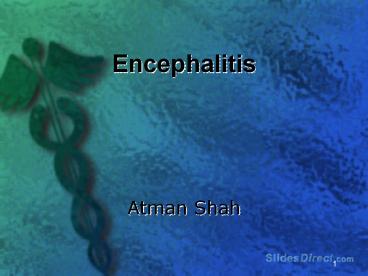Encephalitis - PowerPoint PPT Presentation
1 / 27
Title:
Encephalitis
Description:
'Saving you some precious time!' ... Atman Shah Encephalitis Definition Inflammation of the brain s meninges which also can include the parenchyma and/or spinal ... – PowerPoint PPT presentation
Number of Views:138
Avg rating:3.0/5.0
Title: Encephalitis
1
Encephalitis
- Atman Shah
2
Encephalitis
- Definition
- Inflammation of the brains meninges which also
can include the parenchyma and/or spinal cord or
nerve roots.
3
Encephalitis
- In the United States 20,000 reported cases of
encephalitis. - Herpes virus encephalitis is MC in the US.
- Japanese virus encephalitis is the most common
viral encephalitis outside the United States.
4
Encephalitis
- Untreated Herpes encephalitis has a mortality
rate of 50-75 - Affects males and female equally.
- Individuals at the extremes of age are at highest
risk, particularly for herpes simplex
encephalitis.
5
Etiology
- MC causes in immunocompetent adults is HSV-1, VZV
and enteroviruses. - Epidemics of encephalitis are caused by
Arboviruses
6
Etiology
- Arboviruses?
- Alphaviruses Eastern Western equine
encephalitis virus - Flaviviruses St. Louis enceph. Virus, WNV
- Bunyaviruses California enceph. Virus serotypes
7
Etiology
- Causes in immunocompromised (from organ
transplantation, AIDS) include? - HSV-1
- Varicella-zoster virus (VZV)
- Epstein-Barr virus (EBV)
- cytomegalovirus (CMV)
- human herpesvirus-6 (HHV-6)
- Enteroviruses
8
Clinical Presentation
- Any degree of altered consciousness, ranging from
mild lethargy to deep coma. - Personality changes, hallucinations, agitations
and other behavior disorders. - Focal or generalization seizures may occur.
- Neurological disturbances
9
Clinical Presentation (cont.)
- MC focal findings include
- (depending on location of inflammation)
- aphasia ataxia
- hemiparesis,
- DTR, Babinski reflex ve,
- myoclonic jerks other movement disorders
- tremors and cranial nerve deficits.
10
Clinical Presentation (cont.)
- Hypothalamic-Pituitary axis (HPA) may be involved
resulting in? - Temperature dysregulation
- SIADH
11
Pathophysiology (1)
- Primary infection with HSV-1 usually occurs in
the oropharyngeal mucosa and is typically
asymptomatic. - Symptomatic disease is characterized by fever,
pain, and an inability to swallow caused by
lesions on the buccal and the gingival mucosa.
The duration of illness is 2 to 3 weeks.
12
Pathophysiology (2)
- After primary infection, HSV-1 is spread by
retrograde transport via a division of the
trigeminal nerve - The virus then establishes latency in the
trigeminal ganglion. Reactivation of latent
ganglionic infection with replication of virus
leads to viral encephalitis
13
Pathophysiology (3)
- HSV-1 encephalitis may also be the result of
primary infection from either intranasal
inoculation of virus with direct invasion of the
olfactory bulb and tract leading to ? infection
in the temporal cortex and limbic system
structures.
14
HSV-1 encephalitis showing extensive destruction
of inferior frontal and anterior temporal lobes.
(seizures, personality change, and neurologic
deficits)
15
Histopathology
- Necrotizing inflammatory process characterizes
the acute herpes encephalitis - Perivascular inflammatory infiltrates are usually
present, and Cowdry type A intranuclear viral
inclusion bodies may be found in both neurons and
glia.
16
Necrotizing inflammatory process characterizes
the acute herpes encephalitis
17
Differential Diagnosis
- Brain Abscess
- Epidural and Subdural Infections
- Neoplasms
- Meningitis
- Stroke (Hemorrhagic or Ischemic)
18
Diagnosis
- Cerebrospinal fluid analysis
- CSF analysis typically reveals a mononuclear
pleocytosis (5-500 cells/mm) with mildly
elevated protein and normal or mildly reduced
glucose - Because of the hemorrhagic nature of the process
within the brain parenchyma, the red blood cell
(RBC) count is usually elevated.
19
Diagnosis
- Polymerase chain reaction
- PCR analysis of CSF is sensitive and specific for
the diagnosis of HSE, even in patients already
taking antiviral therapy. (has replaced brain
biopsy as the criterion standard for establishing
the diagnosis) - Results are usually available within 24 hours of
receipt of the CSF specimen.
20
Diagnosis
- Imaging Studies Magnetic resonance imaging
- MRI of the brain is the preferred imaging study.
- The MRI shows pathologic changes, which are
usually bilateral, in the medial temporal and
inferior frontal areas. - Findings of localized temporal abnormalities are
highly suggestive of HSE, but confirmation of the
diagnosis depends on identification of HSV by
means of PCR or brain biopsy.
21
Treatment
- The DOC for HSE is acyclovir, an antiviral agent
that selectively inhibits viral replication.
Intravenous acyclovir (10 mg/kg every 8 hours for
2-3 weeks) is standard - Acyclovir has relatively few serious adverse
effects. The drug is excreted by the kidney, and
the dose should be reduced in patients with renal
dysfunction. - Acyclovir is considered to be appropriate for
serious infections during pregnancy.
22
Case Presentation
- 65 year old man who presented with a seizure
after a three day h/o abdominal pain, odd smells,
and low grade fever. - Six weeks previously he had numbness and tingling
of the right arm, face and leg which resolved.CT
scan performed at that time was normal. - On admission, the temperature was 104 degrees F.
23
Case Presentation (cont.)
- Spinal fluid contained?
- 113 WBCs
- 40 RBCs
- protein 97
- glucose 80
- Unit (mg/dl)
24
Case Presentation (cont.)
- He was treated with acyclovir, and multiple blood
and CSF cultures were negative. - On examination
- The patient was awake and alert with good
attention. - His language was fluent and spontaneous, though
he perseverated and confabulated. - Comprehension of simple verbal commands and word
repetition were normal. - Memory was intact to three of three objects at
three minutes.
25
Case Presentation (cont.)
- Magnetic resonance imaging was performed 5 days
after onset of his current symptoms.
26
In this set of images, there is a region of very
bright signal on MR in the medial temporal lobe
at left (patient's right).
27
Case Presentation (cont.)
- Treatment Outcome
- The patient improved dramatically after a three
week course of acylovir. - (Intravenous acyclovir (10 mg/kg every 8 hours
for 3 weeks) - Impaired renal function developed, presumed due
to acyclovir.































